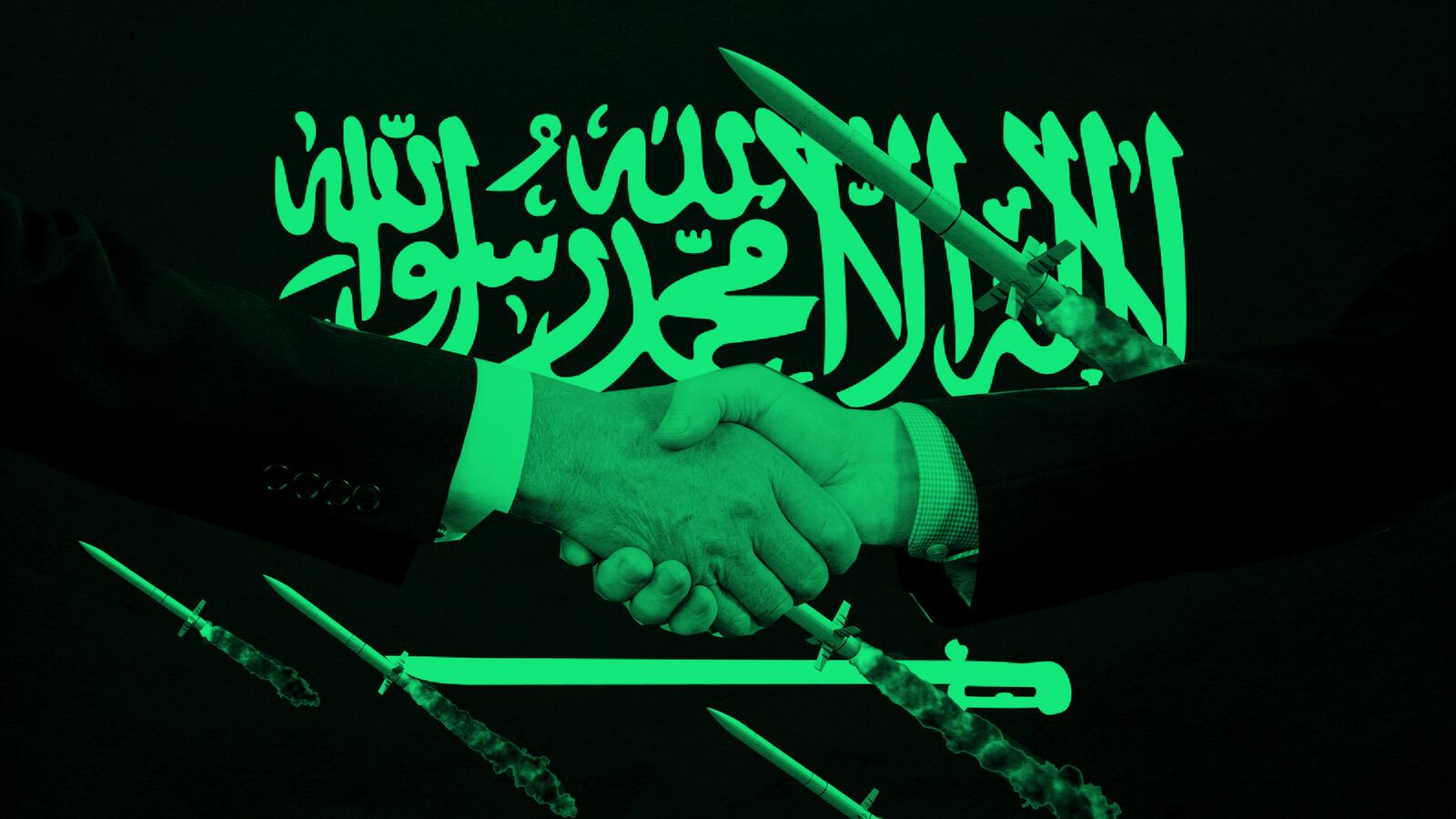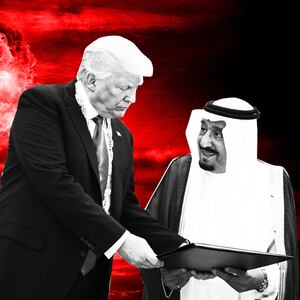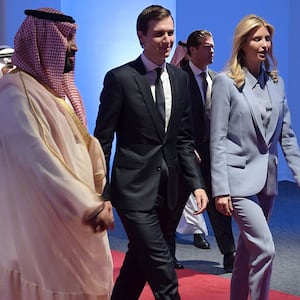In the race to supply nuclear technology to Saudi Arabia, U.S. companies are playing catch-up.
Executives in the industry and American officials told The Daily Beast that despite the Trump administration pushing for a deal with Riyadh, the U.S. nuclear energy sector is behind its competitors, notably Russia and China, when it comes to developing and exporting technology for major international projects.
To get ahead, U.S. companies are mulling over whether to turn a consortium of companies—which some have dubbed “Team USA”—into one that includes foreigners, namely state-run energy firms from South Korea, in an attempt to strengthen its bid in Saudi Arabia.
If the plan comes to fruition, experts say it could offer U.S. companies a greater chance of securing contracts in Saudi Arabia and beating out Russia and China—one of the administration's main economic goals. But the possibility of such a deal has raised concerns among officials in the Trump administration that it may also limit the U.S. government’s ability to ensure Saudi Arabia adheres to certain nuclear safeguards.
The Trump administration, whose officials have publicly said they are pushing Saudi Arabia to commit to the highest standards of inspection and verification—also known as the “gold standard”—have raised the question of whether the partnership with South Korea might help American companies clinch a deal without the U.S. signing a formal cooperation deal with Saudi known as a “123 Agreement.”
The U.S. Atomic Energy Act requires the U.S. sign the 123 Agreement with countries it plans to cooperate with on nuclear energy and sets forth conditions and controls to govern nuclear commercial transactions.
“Engaging in nuclear cooperation with a country, such as Saudi Arabia, that has threatened to leave the nuclear Nonproliferation Treaty to build nuclear weapons, carries extreme risks,” said Daryl Kimball, executive director at the Arms Control Association. “If U.S. companies are considering a business partnership with Korean nuclear companies, such an arrangement increases the burden on the administration to ensure that the Saudis accept rigorous inspections and a commitment never to acquire or seek to acquire… nuclear weapons.”
There is no indication that American companies have followed through with such a plan, but two officials in the Department of Energy told The Daily Beast the Saudis and the South Koreans have offered it up as a winning strategy.
The argument from the Saudi and South Koreans, experts say, is that the nuclear technology that would eventually find its way to Riyadh would be of South Korean origin, not American. Therefore, the U.S. and Saudi Arabia would not need a 123 Agreement. The U.S. companies would only provide other services such as technical expertise, security and staffing.
But there is considerable pushback against that argument in the Department of Energy, current and former officials say.
Combustion Engineering, a company that was absorbed by Westinghouse in 2010, transferred its technology to Seoul to aid in the joint development of a reactor that South Korea then sold across the globe. Since then, South Korea has developed its own technology to manufacture reactors.
But some officials in the Trump administration told The Daily Beast they believe that the South Korean reactors, even if newly developed, are still based on American technology and would therefore require the U.S. and Saudi to sign a 123 Agreement for an American-South Korean consortium to work.
Others, including executives at American companies involved in the Saudi bid, say a U.S.-South Korea partnership without a 123 Agreement could be a winning strategy not only for the U.S., but for Seoul and Riyadh as well. The deal would satisfy Saudi Arabia’s wish for regulatory independence to build up its nuclear sector, it would allow U.S. companies to regain their footing on the international stage and win lucrative contracts, and it would solidify an increasingly close relationship between Washington and South Korea.
American companies—along with companies from Russia, China, and South Korea—are already involved in extensive conversations with Saudi Arabia about the possibility of working to transfer nuclear technology to the kingdom for its plan to reduce their dependence on oil, known as “Vision 2030.”
“Everything to do with Saudi Arabia right now in Congress is seen in light of the [Washington Post’s Jamal] Khashoggi murder and that’s problematic for achieving a sound understanding on civilian nuclear energy,” said Hussein Ibish, a senior resident scholar at the Arab Gulf States Institute. “But this isn’t a weapons technology proliferation issue. For the Saudis, civilian nuclear energy makes a ton of sense, economically and technologically. They’d be crazy not to do this.”
The Department of Energy has doled out seven authorizations to U.S. companies seeking to conduct nuclear-related work in Saudi Arabia. The authorizations, known as part 810s, allow for the transfer of U.S. nuclear technology to the country, though a separate authorization is needed for companies to actually export that technology.
But experts say some of the companies involved in conversations about a U.S. consortium bidding in Saudi Arabia are behind in developing the technology Riyadh would look for in a bid.
Enter South Korea.
Seoul relies heavily on nuclear energy to power not only its economy but also provide much of the country’s electricity. South Korea currently has 24 reactors that provide about one-third of its electricity. And industry experts say South Korea’s state-run energy companies are some of the best in the business, offering clients top-rate reactors at a fixed rate. The country is currently building four nuclear reactors in the United Arab Emirates under a $20 billion contract. It also has a $173 million contract to construct a nuclear research reactor in Jordan.
Officials from South Korea and Saudi Arabia have met over the past two years in an attempt to broker a relationship that fosters cooperation on nuclear energy. And in January, an executive from one of the country’s energy firms, Kepco, said he believed the company “left a good impression” in Saudi Arabia after it had detailed its plans for Riyadh’s nuclear bid.
South Korea could be an attractive option for Saudi Arabia, experts say, because it does not demand the same rigorous standards for inspection and verification as other countries such as the U.S. South Korea does not require that a bilateral cooperation agreement be approved by parliament. It also does not require its clients sign on to the International Atomic Energy Agency’s additional protocol—a safeguard agreement that allows the IAEA to conduct rigorous inspections to ensure countries are using nuclear material for peaceful means.
The signing of a protocol is not a requirement; however, most countries around the world have signed on to it, even countries that do not have nuclear power. The protocol is a safeguard agreement that in particular allows the IAEA to conduct rigorous inspections to ensure countries are using nuclear material for peaceful means.
“I have heard Saudi Arabia thinks [the U.S. partnering with South Korea] is a loophole,” said Robert Kelley, the former director of the IAEA. “If the U.S. encourages the IAEA to take a dive, or if the IAEA allows Saudi Arabia to sign a watered down additional protocol, all four parties benefit.”
Officials in the Trump administration, particularly in the Department of Energy, are trying to persuade South Korea to uphold the “gold standard” of inspections and the IAEA additional protocol with Saudi Arabia, according to one official with direct knowledge of those conversations. The IAEA, too, has asked Saudi to agree to the additional protocol.
“Whether South Korea partners with U.S. firms or not, the Korea Electric Power Corporation [KEPCO] uses U.S.-origin content and therefore cannot sell reactors to Saudi Arabia until Riyadh signs a 123 agreement with the United States,” said Rep. Brad Sherman (D-CA). “If the Saudis go forward with a nuclear program without a 123 Agreement with the United States, if they want to imitate Iran, then they should no longer be regarded as an ally of the United States.”








